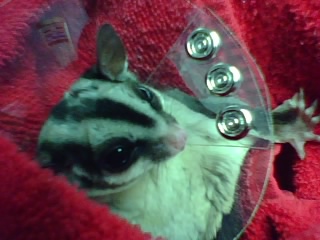This topic is a hot one in my home right now - I have 3 gliders that experience seizures. While not seen in every home, seizures in gliders are not uncommon.
There are several reasons a glider might have a seizure:
1) Dehydration
2) Illness/Disease
3) Neurological seizures
4) Hypoglycemia
Therefore, it is IMPERATIVE that any glider who experiences a seizure be seen by a vet.
A vet exam for a seizing glider should include tests for dehydration, infection and parasites as well as an overall physical exam and a review of diet and routine. In some cases, x-rays may be taken. It is NECESSARY that infection, illness, disease and dehydration be eliminated as causes of the seizure before a glider is labeled with epilepsy or seizure disorder.
Some gliders will seize if they become hypoglycemic. In these cases, it is important that the glider be offered healthy treats/food several times a day and prior to any out of cage time. A routine of food intake should be established and followed STRICTLY to ensure blood sugar levels do not drop. IF the glider does seize, you can offer a bit of kayro syrup or honey after the seizure passes to get blood sugar levels back up quickly. A vet should be consulted and your diet and routine very closely analyzed to help prevent further seizures.
For Dehydration seizures - a vet should adminster sub-q fluids and possibly teach you to administer them for several days following. Make sure the vet tests for any underlying cause of the dehydration. If the seizure was caused by dehydration, it should not recur once the dehydration is remedied. Be sure to monitor for dehydration closely.
For seizures caused by illness or disease - Again, have the vet treat the illness/disease. The seizures should not recur once the illness/disease is treated.
Neurological seizures - come in a variety of types and severity. Your vet will adivse you on courses of action for seizures.
With one of my gliders who experiences seizures, we were able to identify the cause of the seizures to stress/anxiety. Therefore, I do not treat with any medication. Rather, I strive to eliminate all stress/anxiety from the glider's routine and environment (as much as I can). The difficulty with medication for seizures is that med levels must constantly be monitored through blood draws, which are risky in gliders and can facilitate a seizure themselves.
My Mocha has had seizures for 3 years. Though I have been successful in decreasing the frequency of them, they do seem to be increasing in intensity when they do occur. Recently Mocha suffered an injury requiring him to be separated from his cage mate to heal. This has resulted in so much stress and anxiety that his seizures have been very frequent and very severe.
What does a seizure look like?
Sometimes it will look like the "freeze" as I call it. The glider becomes completely still and may stare off. The difference in this and the freezing they do when scared is that during a seizure, they will not react to you. You can touch them or move them or pick them up and their body posture will not change and they will not react to you. Also, they loose grip and may fall.
Other times, it will look like twitching and jerking, maybe foaming at the mouth, maybe loosing grip or maybe a very tight grip that CAN'T be loosened. Often they look as if they are chewing air or dry heaving. Mocha's seizures started as noted above and now when he seizes, he gets a very tight grip that can't be loosened, his body tenses all over, he twitches and jerks and he foams at the mouth.
Seizures are very serious and should only be treated by a vet. Any glider that has seizures should be monitored regularly by a vet. I keep a seizure log for Mocha. I suggest this for all gliders that seize.
The SUGAR group has an ongoing log/study of seizures in gliders. If you have a glider who experiences seizures, please request this log and participate in the study.
